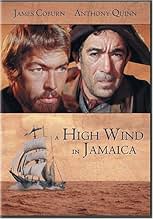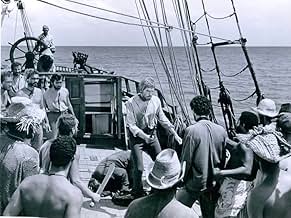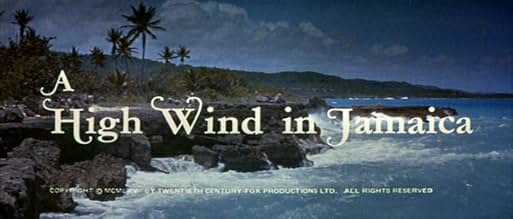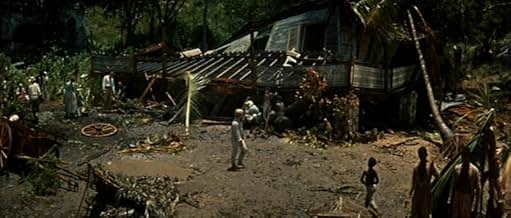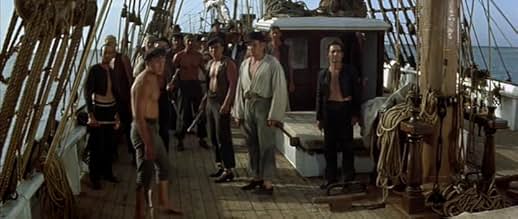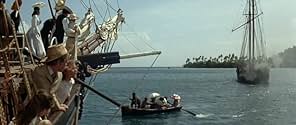NOTE IMDb
6,5/10
2,5 k
MA NOTE
En 1870, une famille coloniale jamaïcaine envoie ses enfants en Grande-Bretagne pour y être scolarisés, mais leur bateau est attaqué par des pirates qui finissent par s'attacher aux enfants.En 1870, une famille coloniale jamaïcaine envoie ses enfants en Grande-Bretagne pour y être scolarisés, mais leur bateau est attaqué par des pirates qui finissent par s'attacher aux enfants.En 1870, une famille coloniale jamaïcaine envoie ses enfants en Grande-Bretagne pour y être scolarisés, mais leur bateau est attaqué par des pirates qui finissent par s'attacher aux enfants.
- Réalisation
- Scénario
- Casting principal
Ben Carruthers
- Alberto
- (as Benito Carruthers)
Gert Fröbe
- Dutch Captain
- (as Gert Frobe)
Avis à la une
As many times before, the IMDb has proven to be such a valuable resource. Like others who have written their comments here, I also saw this movie as a child and could never forget it. Besides, I fell completely in love with the little girl's character and somehow retained the actress's name in my memory for over 20 years: Deborah Baxter. In fact, that is how I found the movie again, because I had completely forgotten its title. The only other actor I remembered for sure was Anthony Quinn, so I began looking at the casts of all of his films whose title suggested pirates or ocean, until I arrived here and --to my own astonishment-- discovered that my memory had not failed me: the girl's name actually is Deborah Baxter! It seems that she only ever acted in two movies; what became of her? Anyway, I am happy to announce here that the movie has finally been released on DVD. I'm definitely buying it.
I saw this fantastic movie for the first and only time as a child in a theater when it was first released in 1965. Since then, I've hoped to see it again and share it with others, but it is not available for viewing anywhere. Repeat, ANYWHERE. It never appears on American TV (I've checked, there are several web sources one can use to track whether specific movies are scheduled to run, and I've never seen any of them showing High Wind appearing on any North American station. In fact, the only time any of theses sources showed it being broadcast anywhere was once, on a network in Japan back in 1988). It has never been re-released for theatrical showings, and it has never been released on video. I even regularly check eBay to see if a "black market" copy might be available, but none have ever shown up.
Mt gut tells me the reason for this is likely the usual in these sorts situations: some endless (and meaningless) copyright dispute. I don't know if that's the case, but if it is, I wish the opposing parties would wake up and realize that (a) this release -- as great as it is -- is too old and unknown to be a big future money maker for anybody, and (b) that whatever that income might be, because of their arguing neither of them is making ANY money of this film.
A great movie, but one lost, in all likelihood because of greed. What a shame.
Mt gut tells me the reason for this is likely the usual in these sorts situations: some endless (and meaningless) copyright dispute. I don't know if that's the case, but if it is, I wish the opposing parties would wake up and realize that (a) this release -- as great as it is -- is too old and unknown to be a big future money maker for anybody, and (b) that whatever that income might be, because of their arguing neither of them is making ANY money of this film.
A great movie, but one lost, in all likelihood because of greed. What a shame.
This mood-provoking 60's-style (ballad theme song) drama recounts a moment from an even earlier era, when there was piracy on the high seas.It stars a group of children who prove there is a group of human beings even less civilized than pirates, or can at least give them a run for their money. Anthony Quinn tenders the character of Chavez, captain of a pirate ship, of whole cloth: we always believe in Chavez and find him a worthwhile study. We have loved like him--whether it was a cuddly little animal or a neat person in our world awhile--for no reason other than that the loved delights us. While the love itself is pure, it can bring on trouble. This is demonstrated in both the film story line and the film's history, the latter being that the film has been basically closeted , perhaps due to society's discomfort with a grown-man's-affection-for-a-little-girl story line. Debra Baxter as Emily is a total charmer, realistically skinnier while unparented at sea.The tale evolves around her character, a 10-year-old English kid raised in Jamaica and now being shipped with her siblings and another family to the mother land to be reared out of her heathen ways.While Chavez's gang invades their ship, the children, as always in their own world, explore the pirate vessel and are still aboard when the clueless pirates take off. They are discovered and the pirates want to chunk them on the next island or worse, but Chavez insists the kids stay until they get to a safe port.The crew mutinees, the kids are saved, but Emily thinks she has committed a deed she will be punished for. An excellant dramatization of the potency of the untamed internal value system, aptly including society's "outsider-bad-men" as a frame of reference. It's a movie to chew over and think about. Children of both sexes enjoy it again and again.
One can only be thankful that Disney did not get hold of Richard Hughes' novel. The saccharine sweetness would have made one gag. The only disappointment that I had with the film was that it did not follow the book. Otherwise, this was a superb film in its own right. Anthony Quinn proved that he could play other characters than Zorba, an often overlooked fact.
The children were so prim and Victorian "proper" that their conflict with the pirates. or privateers, as they preferred to call themselves, was at time hilarious. My favorite scenes were when the children, who were on the ship for months without any means of amusing themselves other than their own devices, spooked the crew with various innocent or mischievous plays, such as pretending to do a burial at sea, and turning around the head of the ships figurehead so that it faced backwards. The superstitious sailors were terrified by what was really childish mischievous fun.
When the ship put into Tampico, where the Captain hoped to leave them behined with the local Madame, played by Lila Kedrova who seemed to have taken acting lessons from Carmen Miranda, the children were spruced up and returned to their clean clothes and with their hair combed. As the crew member doing the grooming explained: "the Captain wants you to look your best for the ladies". "What ladies?" asked the children. Under his breath the seaman muttered "You'll find out." Of course, the local ladies were the ladies of ill repute in a Godforsaken part of the Carribean where anything goes and the law would never set foot.
The beauty of the film is that it rises above the mawkish semtimentally that it could have fallen into. The Captain, Chavez, takes to the young girl, Emily, who is as feisty as they come, and she and the other children take to him. A Victorian version of the Stockholm syndrome where the captives idenity with their captors.
The story is a tragedy, as the pirates who after all, were simply making a living in the only way they knew. It wasn't even a profitable living, just a traditional, but dying, occupation. Suddenly they were stuck with some ill-disciplined little English children travelling to England to be paced in English boarding schools and "civilised", and neither side really understood the other. It was the misunderstanding that caused the problems and led to the final tragedy.
I would recommend this film to people who like to think and ponder over what is right and what is wrong, and from what perspective do we view right and wrong.
The children were so prim and Victorian "proper" that their conflict with the pirates. or privateers, as they preferred to call themselves, was at time hilarious. My favorite scenes were when the children, who were on the ship for months without any means of amusing themselves other than their own devices, spooked the crew with various innocent or mischievous plays, such as pretending to do a burial at sea, and turning around the head of the ships figurehead so that it faced backwards. The superstitious sailors were terrified by what was really childish mischievous fun.
When the ship put into Tampico, where the Captain hoped to leave them behined with the local Madame, played by Lila Kedrova who seemed to have taken acting lessons from Carmen Miranda, the children were spruced up and returned to their clean clothes and with their hair combed. As the crew member doing the grooming explained: "the Captain wants you to look your best for the ladies". "What ladies?" asked the children. Under his breath the seaman muttered "You'll find out." Of course, the local ladies were the ladies of ill repute in a Godforsaken part of the Carribean where anything goes and the law would never set foot.
The beauty of the film is that it rises above the mawkish semtimentally that it could have fallen into. The Captain, Chavez, takes to the young girl, Emily, who is as feisty as they come, and she and the other children take to him. A Victorian version of the Stockholm syndrome where the captives idenity with their captors.
The story is a tragedy, as the pirates who after all, were simply making a living in the only way they knew. It wasn't even a profitable living, just a traditional, but dying, occupation. Suddenly they were stuck with some ill-disciplined little English children travelling to England to be paced in English boarding schools and "civilised", and neither side really understood the other. It was the misunderstanding that caused the problems and led to the final tragedy.
I would recommend this film to people who like to think and ponder over what is right and what is wrong, and from what perspective do we view right and wrong.
I had watched this eons ago on Italian TV but had long forgotten it - the film does come across as somewhat unmemorable at the end of the day, but this offbeat pirate-adventure-with-child-interest has a beguiling charm all its own. That said, the film's very low-key nature might not win it much approval among action-film fans...
Curiously enough, half the film is actually spoken in Spanish (without the benefit of English subtitles!) - and, while it tends to wander because of this, also gives the proceedings a welcome air of full-blooded vividness! Anthony Quinn is his usual larger-than-life self, but his befuddled interaction with the kids endears him to viewers even more here. James Coburn is very amusing as Quinn's second-in-command, who can't speak a word of Spanish and is often at a loss as to what is going on around him (though I would have liked some form of an explanation as to his incongruous presence there). Dennis Price has a notable cameo towards the very end as a solicitor leeringly prying into the children's 'experience' with the pirates, while "guest star" Gert Frobe only appears in one crucial scene as a wounded Dutch captain (but who eventually has a huge bearing on the plot resolution); the film also features Nigel Davenport as the children's father and Lila Kedrova as a 'tavern-keeper'.
The opening hurricane sequence - which gives the film (and the novel it is based on) its title - is extremely well done, though the climactic courtroom sequence and its outcome (the willful execution of the pirates) is rather too rushed to be as effective as it needs to be. The antics of the children, of English and Spanish origins, are fun to watch - but Deborah Baxter leaves the best impression, as she is the one to bond most with Quinn. Larry Adler's lovely score subtly accentuates Douglas Slocombe's colorful widescreen imagery.
Alexander Mackendrick was an American-born/Scotland-bred director who made his name at Britain's famed Ealing Studios and went on to have a very brief but often brilliant career; this was actually his penultimate work. Incidentally, the two films of his I've yet to watch - MANDY (1952) and SAMMY GOING SOUTH (1963) - also feature children as their protagonists.
Curiously enough, half the film is actually spoken in Spanish (without the benefit of English subtitles!) - and, while it tends to wander because of this, also gives the proceedings a welcome air of full-blooded vividness! Anthony Quinn is his usual larger-than-life self, but his befuddled interaction with the kids endears him to viewers even more here. James Coburn is very amusing as Quinn's second-in-command, who can't speak a word of Spanish and is often at a loss as to what is going on around him (though I would have liked some form of an explanation as to his incongruous presence there). Dennis Price has a notable cameo towards the very end as a solicitor leeringly prying into the children's 'experience' with the pirates, while "guest star" Gert Frobe only appears in one crucial scene as a wounded Dutch captain (but who eventually has a huge bearing on the plot resolution); the film also features Nigel Davenport as the children's father and Lila Kedrova as a 'tavern-keeper'.
The opening hurricane sequence - which gives the film (and the novel it is based on) its title - is extremely well done, though the climactic courtroom sequence and its outcome (the willful execution of the pirates) is rather too rushed to be as effective as it needs to be. The antics of the children, of English and Spanish origins, are fun to watch - but Deborah Baxter leaves the best impression, as she is the one to bond most with Quinn. Larry Adler's lovely score subtly accentuates Douglas Slocombe's colorful widescreen imagery.
Alexander Mackendrick was an American-born/Scotland-bred director who made his name at Britain's famed Ealing Studios and went on to have a very brief but often brilliant career; this was actually his penultimate work. Incidentally, the two films of his I've yet to watch - MANDY (1952) and SAMMY GOING SOUTH (1963) - also feature children as their protagonists.
Le saviez-vous
- AnecdotesThis film had a long and troubled history. Richard Hughes's original novel, published in 1929, is a dark and disturbing story, and James Mason, who greatly admired it, wanted to make a film of it in the 1950s, producing it for Twentieth Century-Fox as well as playing one of the leads. However, the studio saw it as a light-hearted Disney-style pirate adventure aimed at a family audience; several years after Mason's plans had come to nothing, they revived the project along these lines with Nunnally Johnson assigned as writer and producer. When Alexander Mackendrick was approached to direct, he was appalled by the travestying of Hughes's novel, and was able to persuade leading man Anthony Quinn that a more faithful and disturbing version of the book was a better idea. Johnson's script was rejected. Quinn used his considerable influence to help Mackendrick and the ensuing film was highly praised; it was, however, cut by the studio by about 25 minutes, which Mackendrick claimed had ruined it. He always insisted subsequently that he should never have attempted the film, which was a box-office failure.
- GaffesThe hurricane at the beginning of the film is rather clearly created with a combination of wind machines and water sprayed onto the set. Despite the torrential downpour there is sun-dappling beneath the tree where Emily is looking for her cat, and blue sky and puffy white clouds are visible in the distance behind her and her father.
- ConnexionsReferenced in La fiancée du pirate (1969)
Meilleurs choix
Connectez-vous pour évaluer et suivre la liste de favoris afin de recevoir des recommandations personnalisées
- How long is A High Wind in Jamaica?Alimenté par Alexa
Détails
- Durée1 heure 43 minutes
- Couleur
- Rapport de forme
- 2.35 : 1
Contribuer à cette page
Suggérer une modification ou ajouter du contenu manquant

Lacune principale
By what name was Cyclone à la Jamaïque (1965) officially released in India in English?
Répondre

